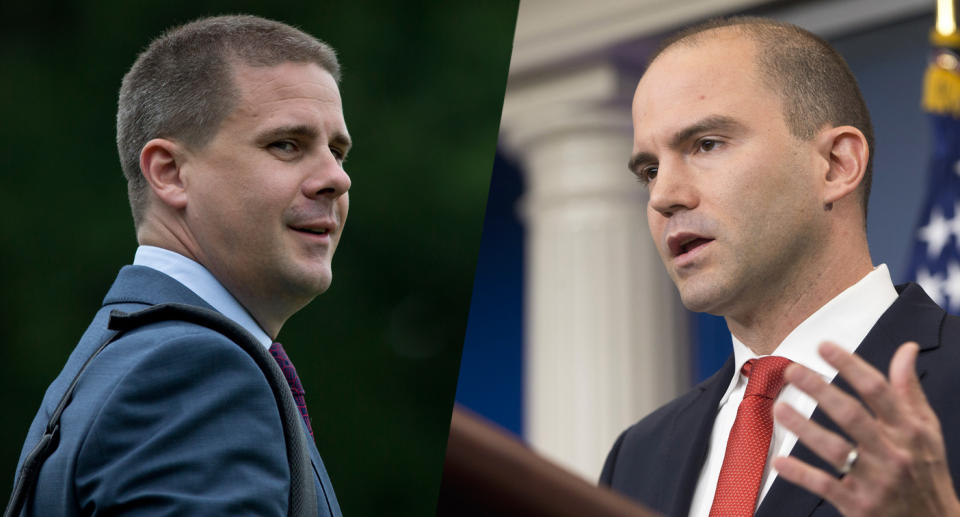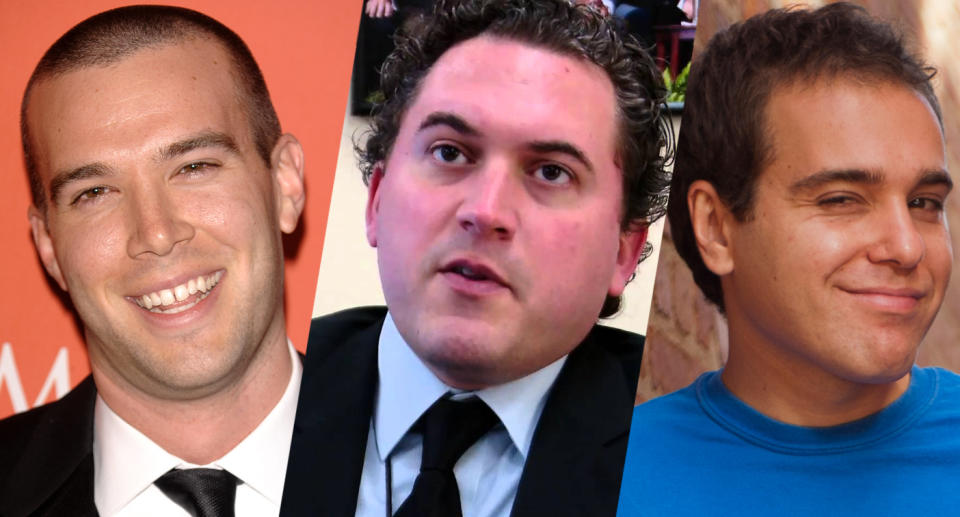Obama’s White House alumni fight Trump tweet for tweet — earlier and harder than ever before

Some Democrats may think former President Barack Obama has been too quiet since leaving office on Jan. 20 — particularly on the subject of his controversial successor, Donald Trump.
The same cannot be said of the people who worked for him.
In the days since Trump assumed the presidency, an increasingly ardent and even aggressive army of formerly buttoned-up Obama administration alumni — aides, advisers, speechwriters, spokespeople — have taken to their own social media platforms to rail, loudly and publicly, against pretty much every move Trump has made, undaunted by his 23.5 million followers and determined to tweet fire with fire.
This is a new development in American politics.

“There are more than a few of us who believe deeply in holding this administration’s feet to the fire — especially when they offer falsehoods to the American people and distort our record,” a former senior administration official tells Yahoo News. “We have an email chain going where we share impressions, etc.”
The latest to enter the fray is Colin Kahl, a Georgetown University professor who served as a national security official under Obama. Angered by the current administration’s attempts to blame Obama for the first counterterrorism misstep to occur on Trump’s watch — a botched Jan. 29 raid in Yemen that left one American commando dead — Kahl on Thursday fired off a flurry of tweets explaining that Obama neither planned nor approved the mission and that any reports saying otherwise were “totally false.”
“Trump and his team owns the process and the ultimate decision — and the consequences,” Kahl snapped.
Kahl isn’t alone. Former senior adviser Dan Pfeiffer, speechwriting directors Jon Favreau and Cody Keenan, speechwriter Jon Lovett, longtime Obama spokesman Tommy Vietor, Deputy National Security Adviser Ben Rhodes and many others are flaming and fact-checking the new president up to a dozen times a day.

It’s not that previous White House graduates refrained from countering or criticizing their bosses’ successors. They didn’t, of course. But the current go-round is different — faster and more furious — for several reasons.
First, there’s Trump himself, who has never been shy about picking fights (and who has shown no sign of backing off as president). His incessant Twitter spats — with enemies, with allies, even with Arnold Schwarzenegger — have set a coarser and more combative tone for presidential discourse and given his opponents little choice but to turn their own volume knobs up to 11. At the same time, his immediate blitzkrieg of provocative executive orders has invited an equally rapid response.
Then there’s the sour mood of the country to consider. Previous presidents enjoyed honeymoons with the public. Not Trump. A popular-vote loser who refused during his transition to reach out to the nearly 73 million Americans who cast ballots for other candidates — and who has catered exclusively to his base as president, inspiring worldwide protests — Trump has seen his job-approval rating crater much faster than any of his predecessors. According to Gallup, Obama’s disapproval rating didn’t surpass 50 percent until 936 days after his inauguration. For George W. Bush, 1,205 days. Before him, Bill Clinton, 573; George H.W. Bush, 1,336; and Ronald Reagan, 727. Trump, however, crossed the same unfortunate threshold just eight days into his White House tenure. It’s not just Obama alumni. More people oppose the new president, period — and they’re spoiling for a fight.

But perhaps the most important factor here is technology.
The last White House exodus took place in 2009. Social media existed, but it was hardly dominant. Twitter had about 2 million active users; today it has more than 300 million. Facebook had 150 million; now it has 1.86 billion. Instagram wouldn’t launch for another year and a half. If Obama was the first social-media president, the alumni of his administration represent the first generation of White House staffers to learn the ropes of social engagement while on the job, then emerge into the wider world fully immersed in the new media environment and prepared to harness its power and reach for their own political ends.
“This is really the first time in history where you have a huge cadre of former staff who can all broadcast their thoughts whenever they have them and fact check the current administration in real time,” says former Justice Department spokesman Matt Miller, who frequently rebukes the Trump administration over law enforcement issues on Twitter.
By way of comparison, George W. Bush’s chief strategist, Karl Rove, didn’t join Twitter until Jan. 8, 2009, a few days before Bush left office; between then and early February 2009, he didn’t tweet a single direct criticism of Obama. Dana Perino, Bush’s last press secretary, didn’t sign up until May 2009; her feed was similarly muted. Bush speechwriter Michael Gerson, meanwhile, tweeted only four times that entire year — none of his tweets were political — while former Bush press secretary Ari Fleischer tweeted only once. “Savoring the Dolphins great win last night,” Fleischer wrote on Oct. 13, 2009. “Go ‘fins.”
When the Bush folks did tweet, it was mostly to promote their work for establishment media outlets: a Wall Street Journal column, a National Review blog post, a hit on Fox News.
“I was at DOJ at the time,” says Miller, “and I don’t remember anyone — no former Bush administration official — pushing back at us on social media.”
That’s not the case anymore.
On Feb. 3, alone, Tommy Vietor (87,900 followers) implied on Twitter that Trump is a “lunatic”; questioned the legality of Trump’s doctor talking to the New York Times; and referred to the president’s tweet about putting Iran “on notice” as “chest-thumping bulls***.”
Dan Pfeiffer (154,000 followers) retweeted a story about Trump rolling back financial regulations and sarcastically asked readers to “remember when Trump’s working class base flocked to his rallies to demand fewer rules and bigger pay days for Wall Street.” Ben Rhodes reminded his 29,600 followers that revoking 100,000 visas, as Trump has done with his travel ban, “is not keeping out ‘the bad’”; hours earlier he linked to an Instagram post by former White House photographer Pete Souza showing Obama laughing last September with Australian Prime Minister Malcolm Turnbull, a close ally whom Trump had just blasted over the phone. For his part, Souza has all but transformed his Instagram feed (740,000 followers) into an implicit critique of the new president, posting archival images of Obama talking with young refugees and hanging out in the Oval Office with Merrick Garland, his stymied Supreme Court nominee — a kind of alternate Democratic reality where every Trump outrage is met with an image of Obama doing the exact opposite.

Not all of these ex-Obamians are new to the so-called resistance: Vietor, Favreau and Lovett hosted a 2016 campaign podcast for the Ringer called “Keepin’ It 1600,” which laughed off the possibility of a Trump presidency until the bitter end. Distraught by the outcome, they recently launched another podcast — “Pod Save America” — under the banner of their own company, the pointedly titled Crooked Media. Their goal? To stop being analysts and start being activists.
“I woke up feeling like sitting on the sidelines wasn’t an option anymore,” Vietor told the Daily Beast. “I wanted to be part of whatever is going to happen over the next four years to preserve the things we fought for at the White House.”
Other members of the Obama administration, however, are just getting started — mainly because, up until a few weeks ago, they were still working for the president (who was, in turn, urging a gracious transition).
What all these former White House staffers share is a strong desire to use the sizable media platforms they built while serving the leader of the free world — and the authority they accrued as people who actually know how the U.S. government works — to repudiate policies they disagree with and set the record straight when necessary.
“When there are specific issues we need to take on, we’ll consult with the relevant experts,” says the former Obama administration official. “For example, [former Homeland Security Adviser] Lisa [Monaco] provided a detailed tick-tock of what actually went down with regard to Yemen. Everyone is interested in batting down some of this nonsense, and those we’ve reached out to have been more than happy to help (even those who were in career posts).”
“Just about every Democrat in the country feels incredibly motivated to speak out right now,” says Miller. “But while a lot of Dems are motivated, people who worked for the Obama administration — people who have a little bit of a voice — feel something else: a deep sense of obligation to use those voices for good.”
And as Trump himself has demonstrated, political combatants no longer need to rely on, say, CNN to be heard. “I think the lesson from Trump is if you’re filtering every message and idea you have through traditional media, he will swamp you with a tweet,” Vietor recently told Politico. “So we need to build up infrastructure that allows people to communicate directly with young people across the country.”
This means, says Miller, that Americans should expect more Obama-era staffers to start speaking out against Trump in the weeks and months ahead, creating an unprecedented sense of direct conflict between one administration and the next.
“I imagine this is going to break down agency by agency, eventually,” he predicts. “What you’re going to see is someone from Obama’s Environmental Protection Agency pushing back on something that Trump has done or said that is wrong or not true. You’re going to see someone from Labor, and so on. Nobody knew who Colin Kahl was before this week. But now they will.”
With Olivier Knox



